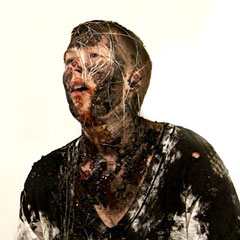Fringe Shorts: Dirty
Lightsey Darst thought Chris Schlichting's "Dirty" was great; it's on Friday, 8/11, at 10; Saturday, 8/12, at 4; Sunday, 8/13, at 2:30, at the Southern Theater.

Dirty contains a theme of social selection, of how we decide that some people aren’t fit to join our picnics. Two curtains, labeled “here” and “there,” divide the stage space into the realm of the okay and the not-okay; the dancers wear silly compliments printed on their clothes (“sweet pants,” “kickin tee”); bits of abstract, though suggestive dialogue (“tell them what it is,” Karen Sherman instructs; “it’s a. . . dirty Sanchez,” Justin Jones confesses) pepper the show; there’s even an extended scene, in which a messy Schlichting intrudes on a picnic and gets attacked by the picnickers. Oh, that aesthetic, you might be saying—the cleverer-than-thou collage, punctuating some practically obligatory dance—but don’t worry: the theme’s a mere fig leaf for Schlichting’s fascinating dance style.
Schlichting, like many contemporary choreographers, is interested in gesture, in occupational movement, in the things that people do, but he explores this in his own way. Schlichting reminds us that gestures are not only denotative but also connotative: that is, waving feels a certain way, pointing feels a certain way, and that motion emotion comes along with what we mean by waving or pointing. The current runs both ways, the gesture conveying but also changing meaning.
Schlichting does for gesture what French theorists have done for words, but more affirmatively: his gestures seem original rather than imitative, arising from physical impulse and then acquiring symbolic meaning. He investigates (with a slowly unfolding pointing hand) the beauty of gesture, the emotion of each point in space. Lest all this sound a little dry, let me assure you that this style is fervently physical—the dancers get more breathless than is generally the case in postmodern dance—and rich rather than spare, abounding in invention, transition, and intelligent repetition.
Dirty also features the live music of Pablo and the Mila Vocal Ensemble, and it’s to Schlichting’s credit that he doesn’t still the dancers while the singers are performing. Instead, his choreography inhabits the music: a quiet, gestural, but not blandly readable duet to one of Pablo’s songs, and a fierce whirlwind of action, the dancers’ attack matching the violence of the singing style, to the Mila Vocal Ensemble’s eerie Eastern European music.
Schlichting’s assembled a marvelous cast of confident, adept, eye-occupying performers (Morgan Thorson, Anna Marie Shogren, and Joanna Furnans danced, along with those mentioned above), but Hannah Kramer stands out. Her quiet mischief, the sense she gives of knowing something she’s not telling, perfectly suits Schlichting’s explorative style.
note
*
As a public service announcement, I feel compelled to say that the star ratings on the Fringe Festival’s website should be given no credence. Dirty got dropped from the obligatory 5-star rating because of one review from someone who clearly knows nothing about dance or art criticism. And come on, people, how can five stars be the standard rating? Aren’t you holding anything back for the Rapture?